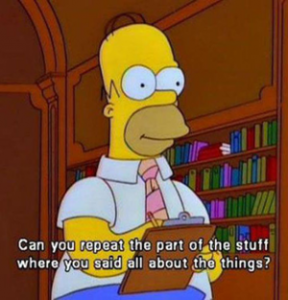
Does it affect life at home, at school or at work?
Take 5 minutes to complete the Warning Signs Checklist and discover whether you or your child could have learning difficulties that are impacting your life, and what to do about it.
Take The Free Warning Signs Checklist! Do your child’s eyes get glazed over when you’re talking to them? Do they have a hard time following through on instructions you’ve given them? When it comes time to do their homework, are they confused about what they’re supposed to do? Has their teacher commented that they often don’t get started on an assignment but just sit at their desk? All of these may be symptoms of poor listening comprehension.
Do your child’s eyes get glazed over when you’re talking to them? Do they have a hard time following through on instructions you’ve given them? When it comes time to do their homework, are they confused about what they’re supposed to do? Has their teacher commented that they often don’t get started on an assignment but just sit at their desk? All of these may be symptoms of poor listening comprehension.
Listening comprehension is a critical academic and social skill that we use every day of our lives. There are many processes involved in verbal comprehension and if one of them is weak, following instructions, or just listening to someone talk can become a daunting task.
People that struggle with listening comprehension often perform better at the beginning of the day. As the day goes on however, they may become more and more overwhelmed as their listening comprehension fades. When I’m explaining this to some of my younger clients, I tell them that everyone has a “listening tank”. The size of our listening tank determines how much information we can take in and process well. Their listening tank is smaller than it should be, so as more and more water (information) is poured in, their tank will fill up quickly and begin to spill over.

When overloaded with information we tend to get that ‘glassy eyed stare’ from weak listening skills.
Imagine looking around in class and realizing you don’t know what the teacher’s instructions were. Everyone is hard at work and started their assignment and you are left just staring at yours, often too embarrassed to ask for clarification. Some children will develop coping mechanisms to avoid this embarrassment as much as possible. They will look over at their neighbor and see her math book is open and pull out their math book. Perhaps the teacher has written the page numbers on the board.
I hear from lots of teachers, however, who find students just sitting there and staring at their desk not getting started. When asked, all too often they reply ‘I don’t know what to do.’ Homework details are frequently given out at the end of the day when listening comprehension is often at its weakest. If your child is dealing with listening issues, by that point in the day, their brain is tired and unable to process further details. Later that night parents will often hear “I don’t know” when asked what homework they have or what’s next in their project.
We all have experienced something similar to this, perhaps when we’re tired at the end of a long day or we aren’t feeling well. Someone is talking to us and at some point in the conversation we suddenly snap back and realize, “I have no idea what they just said”. It’s almost like Charlie Brown’s teacher, droning on in the background. We know that they’re talking but we have mentally checked out. This ‘checking out’ isn’t voluntary and often we are unaware that it is happening until we snap out of it.
At Breakthroughs in Learning we work with children and adults with weak listening comprehension every day. There’s no magic moment when the problems children face disappear and so we see many adults that have struggled with following instructions their whole lives. One tool we offer parents that can help lower stress levels at home is program called “Learn To Listen”. A free, simple, 7 step routine designed to help those with weak listening comprehension.
At Breakthroughs in Learning, we focus on remediation and developing the skills that are weak. This program isn’t intended to develop listening comprehension by itself but rather to offer relief and success at home and/or in the classroom while the skill is being developed by other means such as our IBDP (Individual Brain Development Program) or Brain Booster workbooks specifically designed to develop listening comprehension.
Listening Comprehension is a critical skill for academics, social interactions and workplace success. If left unaddressed, poor listening comprehension can significantly impact these areas of life. For more information and to discover how Breakthroughs in Learning can help you develop listening comprehension schedule your free consultation now.
Subscribe to our newsletter and receive regular articles and resources to help you or your child perform better at school, home or work.
suscribe now
Post Your Comment Below